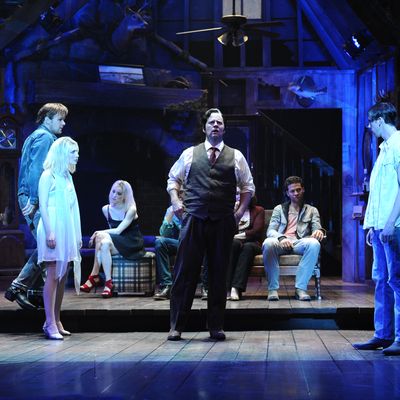John Mellencamp and Stephen King have been talking about their stage collaboration, Ghost Brothers of Darkland County, for the better part of a dozen years. During that time, Ingmar Bergman muse and film/stage director Liv Ullmann said “thanks but no thanks” to the project, and one previously scheduled opening date, four years ago, was scuttled because the script needed more work. (Esquire wrote briefly about it in 2007.) So as the audience filed into the Alliance Theatre in midtown Atlanta last night for the musical’s first night of previews, the curiosity factor was high. Would Mellencamp’s rock songs translate to the stage? Would King’s pop-pulp writing? Was this going to be a colossal train wreck? Would Johnny Cougar’s girl Meg Ryan be there?
The Alliance is a midsize theater with a growing reputation. It won a Tony Award in 2007 for Best Regional Theater, and many Broadway-bound shows have premiered here, including Elton John and Tim Rice’s Tony-winning Aida, The Color Purple, and Sister Act. It’s obviously too early to pass judgment on Ghost Brothers, it being night one of an out-of-town preview (and this not being an official review), but with two titanic pop-culture names behind the production, it’s worth describing.
As I walked in fifteen minutes before showtime, doors to the theater cheekily warned the show would contain “Stephen King levels of profanity and graphic violence.” (It didn’t.) The Playbill’s plot summary name-checked Tennessee Williams, William Faulkner, and the story of Cain and Abel as reference points.
Literary influences were clearly more important than theater conventions: As the audience streamed in, the set — a multitiered rendition of a rural Mississippi hunting cabin and its environs — was visible and several actors were already onstage. A few sat so still, I initially mistook them for mannequins; one lazily strummed a guitar. The set itself, with dilapidated wooden cabin, corrugated tin roof, and fading water tower, was more True Blood than Wise Blood.
A few minutes before the show began, Mellencamp and Ryan snuck into the back row of the theater, occasioning a lot of murmuring and head-turning among the audience, though everyone kept a respectful distance. Fewer noticed King, under his mop of salt-and-pepper hair, sitting several seats away from them in the same row.
The production opened with actor Jake La Botz, who plays a version of the devil called The Shape, rising from the floor with a guitar strapped across his back, addressing the audience directly. This nod to rock-and-roll clichés felt, at least, like a clever play on expectations, and La Botz, who also has put out six albums as a bluesy singer-songwriter, infused his performance with the appropriate swagger and humor.
The story that followed: Two brothers — one a struggling musician (played by ex–American Idol runner-up Justin Guarini), the other a young author (played by Lucas Kavner) — whose relationship is beset by rivalry meet at a family cabin, where 30 years earlier their father witnessed the deaths of his own battling brothers. The narrative toggled between the past and the present with ghosts of the dead commenting and occasionally trying to influence the modern-day events like an overcaffeinated Greek chorus. Despite treading on what seemed to be typically macabre King terrain, the story itself was pretty low on blood and gore. King seemed far more interested in paying homage to Southern Gothic icons — Faulkner, Williams, and Flannery O’Connor were all mentioned — than delivering his trademark frights.
The music, which Mellencamp wrote and Americana producer extraordinaire and frequent Coen Brothers collaborator T Bone Burnett helped direct for the stage, ranged from swampy blues jags and elegant old-school country bummers to stomping roots-rock and gospel sing-alongs. (A radio-play-type recording of the story, featuring Elvis Costello, Neko Case, Kris Kristofferson, and Sheryl Crow, is due out this spring.) Nothing sounded exactly like something off a Mellencamp album, but nothing was exactly out of his wheelhouse either. Elaborate dance numbers were wisely kept to a minimum.
The crowd was an interesting mix, full of folks who looked like they were on their way to a Mellencamp show and plenty of presumed Alliance season ticket holders who weren’t quite sure why there were so many bearded dudes wearing shorts and drinking Shiner Bocks. On the way out, I heard one older patron complaining that the show was “too loud,” and another saying that she couldn’t hear the actors’ lines. (There were some problems with the sound mix and a few malfunctioning microphones, but as this was just the first night of previews, a few minor glitches are a given.) A parking lot attendant told me that some people left early, but it couldn’t have been too many because as the cast took their final bows, the auditorium was mostly full. Meg Ryan could be spotted dancing in the back row. Some seemed mildly disappointed to find that the show’s famous creators weren’t hanging out in the lobby gabbing with the departing crowd afterwards, but by the time the house lights came up, King and Mellencamp had quickly and quietly slipped away into the night — almost certainly to do some more tinkering.


